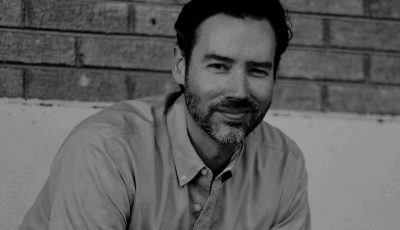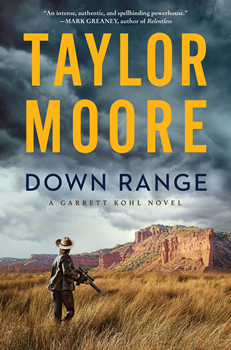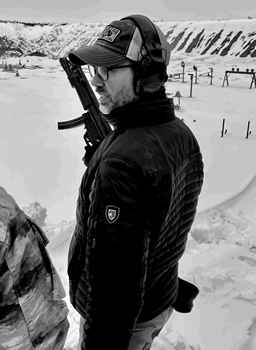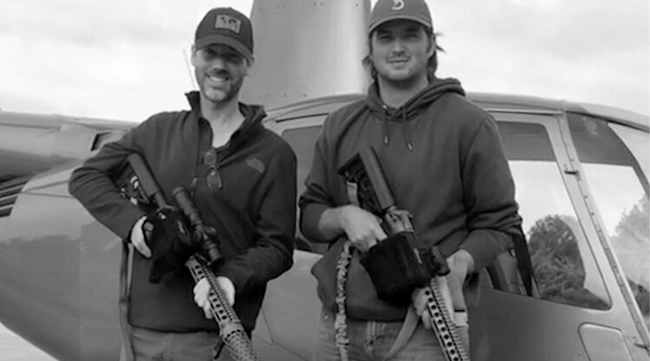

BookTrib Spotlight: Taylor Moore
High Drama on the Texas High Plains—A New Action Hero Is Born
“It seemed the faster he ran, the closer his ghosts followed. And he shuddered to think what would happen when they finally caught up with him.”
Garrett Kohl has a lot of history behind him. A Green Beret turned DEA Special Agent, he has accumulated more than a decade of war-zone tours and undercover assignments in the US and now in Afghanistan. But in Taylor Moore’s DOWN RANGE, his mission is entirely different.
A snap decision to save a 10-year-old Afghan boy named Asadi from a massacre has landed him in major hot water with the CIA, and his CIA boss has told him in no uncertain terms to take the kid back with him to the States for a week or two while she tries to clean things up. Of course, “clean things up” could mean a whole lot of things, and to play it safe, he’s going back to the territory he knows best—the vast, empty Texas High Plains and the tiny town and worn-out old ranch where he grew up.
There are ghosts back there, though. He left on bad terms not only with the town, but his own family, and he has no idea if they’ll welcome him back. That’s not the worst of it, either. While he was gone, the cartel moved in. The town became a hub of drug trafficking, and corruption crept in everywhere. Kohl is trying hard to stay out of the way and keep the boy safe, but now that his refuge has become a killing ground, they are soon all in the crosshairs.
He knows the land like the back of his hand, but is that enough? His family is behind him now, but how can they survive if they are outnumbered and outgunned? “We live as a family,” his brother says, “we die as a family.” But unfortunately for Garrett Kohl, it looks like that’s exactly what’s about to happen.
This is a stunning debut. It is filled with character and authenticity and excitement, and its rolling climax just keeps building, topping itself over and over. With DOWN RANGE, a memorable new action hero is born—and a major new author.
Taylor Moore comes by the authenticity honestly. He’s a sixth-generation Texan who worked for the CIA in both analysis and operations and then consulted for the Department of Defense in theater security cooperation, force protection, and counter-illicit trafficking.
“I think there’s a lot of me in Garrett, but more on a personal than professional level,” he says. “Throughout DOWN RANGE, he’s the voice of reason in a world of crazies. Of course, I’m fully aware that I’m probably the crazy person in other people’s stories. But that’s just the nature of working in intelligence, law enforcement, and defense. You’re going to come across some big personalities. I think I was able to effectively imagine Garrett’s real responses, which are at times funny, because I’ve been in his shoes. And I know what it’s like to get chewed out by someone who holds your career in the palm of their hand. So if those scenes come across as authentic, it’s because they are.”
The kind of criminal activity he encounters in that part of Texas “also exists in a pretty big way,” Moore says. “Amarillo sits at the intersection of Interstate 40 and Interstate 27, which makes it a nexus for drugs trafficked east and west and north and south across the country. The city is virtually isolated from other major hubs, and the outlying farming and ranching communities are that much more secluded, making them perfect places for drug trafficking and even manufacturing. A DEA special agent once told a contact of mine that the Texas High Plains was still like ‘the old Wild West.’ From what I’ve seen, heard, and read, I absolutely believe it.
“The physical pull to the High Plains was my wife, who was born and raised there. I was pretty resistant to relocate at first, not only for career reasons, but out of pure reservations given the seclusion and distance from the rest of the world. But once I got settled in, the region became a very special place to me. Instead of viewing the remoteness as a negative, I started to love it. I found beauty in the vast emptiness and peace in its quiet isolation. There have been a few times when I’ve actually pulled over on the side of the road and just gazed out over the plains. There’s something about seeing as far as the eye can see and hearing nothing but the wind that’s like no other experience. In several places, I could’ve sat for hours, maybe even days, without seeing another living soul. And I’ve never experienced that anywhere except on the Texas High Plains.
“Conversely, isolation and seclusion bring an element of danger. In forgotten places, anything can happen because nobody’s watching. Unfortunately, that attracts the wrong kind of people, the kind who don’t want to be watched for nefarious reasons. People go missing and heinous crimes are committed all the time. In some ways, it’s no different than it was when outlaws like Billy the Kid roamed the plains. But the people who live out on the land have the same grit as the ones who first settled it. They’re the kind who don’t back down, no matter what. With its tornadoes, blizzards, wildfires, and drought, the Texas High Plains can be a harsh place to live, but it’s also the absolute perfect setting for a hard-hitting action-packed thriller.”
Moore still had to do his research, though.
“I read a lot of nonfiction books and watched documentaries. But a good network of subject matter experts is paramount for a good writer,” he says. “I know quite a bit about firearms, as well as military tactics, techniques, and procedures, but nothing compared to the guys I talk to, who either were or still are in the special operations community, some of whom shoot competitively. The same goes for the helicopter scenes. In addition to watching about a million videos, I actually studied flight manuals. But nothing beats having a former pilot from the Army’s 160th Special Operations Aviation Regiment just a phone call away.
“Learning to shoot from a fast-moving helicopter, however, was something I just had to experience myself, and it was probably the most fun part of the research process. If there’s ever the opportunity to learn by doing, I take it. You can read about SWAT teams or how to shoot from a galloping horse, but what better way to get the feel than to actually do it yourself. Fortunately, most people I’ve encountered have been eager to help. I’d tell any writer out there, if there’s someone who has a skill set you need, don’t be afraid to ask. The expertise they bring to the table is absolutely invaluable.”
And, of course: “I had the good fortune to work in both the CIA’s Directorate of Intelligence and Directorate of Operations. As an analyst, some of my most memorable moments included briefing cabinet-level officials, National Security Council staff, US ambassadors, and a range of general officers, American and foreign. On the operational side, my meetings were a bit more under the radar. Knowing that the information we were gathering was in support of missions that made the world safer was something I’m proud of and will certainly never forget.
“I think what surprised me the most was how much working in intelligence changed me as a person and altered my worldview. For example, I can no longer look at major news events and just accept the story as told. I’m always searching for the details I’d once had access to and trying to develop that level of understanding I had when it was my job. Intelligence professionals in analysis and operations are consumed with delivering accurate information and providing the most detailed assessments to the policymaker and warfighter. Once you’re out of that world, it can be a bit frustrating. If something big goes down, I’m always left wondering what really happened.”
As for the book itself: “The story really evolved from another book I was writing, more of a traditional spy thriller set entirely in Central Asia. Garrett Kohl was actually a side character in that story who ultimately stole the show. In a conversation with my agent, we decided to shift the focus to Garrett and move the setting to Texas where I live now.
“Having written multiple versions of the first manuscript, I wasn’t super excited about starting from scratch, but it was definitely the right call. And I knew that from the very first chapter. It all just clicked, and the story unfolded like never before. My fingers literally couldn’t type fast enough to match the story’s tempo.
“When I was in training at the CIA, one of my instructors once told me, ‘You genuinely like people, and it shows.’ Of all the feedback I’ve received over the years, it’s the only thing I remember, and it still means a lot to me. I do a million things wrong, my wife can attest to that, but I do have a real fascination and interest in people, which includes their fears, joys, ambitions, and secret desires. So I think that comes out in my writing.
“Additionally, I’m in a critique group with two New York Times bestselling romance writers, who have taught me a lot about setting and tone and doing the level of world-building that pulls you into the pages and become part of the story. There’s a beautiful rhythm to a great romance, themes that are universal, and I wanted to bring that to readers who might not be traditional fans of the thriller genre. I tried really hard to incorporate heart and soul into DOWN RANGE, along with the bullets and bombs.
“Like many writers, I did not find the querying-agents process to be a fun one. I was turned down a lot. But I took the feedback I was given, rewrote the manuscript, and resubmitted several months after a major overhaul. After finally getting my agent, I rewrote the novel once more, only to have him suggest that we scrap it altogether and start something new. You can imagine how that felt. But the bottom line was that I wanted to be a published author. So I woke up around four that next morning and started writing a brand-new book. I don’t view that as a catastrophe, just part of the process of achieving my goal. If there’s an easier way to do this, I still haven’t found it. But I’d do it over and over, again and again, to get to the place where I am now. It’s the bumps in the road that make the accomplishment all the sweeter.
“I also can’t say enough about how much International Thriller Writers has meant to me in the process. ThrillerFest was the link to finding both an agent and editor. The road to publication was a bit more involved than that, but I can’t oversell the benefits of networking, and there’s no better place to do it than ThrillerFest.
“My story improved as my writing improved, again much of that thanks to ITW. Attending numerous classes and panel discussions, I learned from writers like Steve Berry, James Rollins, Gregg Hurwitz, and Robert Dugoni, who doled out a treasure trove of techniques that made my manuscript sing. The book further evolved with the help of my agent, John Talbot, and my editor, David Highfill, both of whom have the right finesse when it comes to suspense cadence and calibrating tone, as well as the vision for great story development. The novel that ultimately became DOWN RANGE is an example of a good team coming together in a really wonderful way.”
The bottom line, he says, is simple. “If you want to get published, you can. It is possible. But the road to publication is paved with a million words. Write. Write. Write. All the time. Every chance you get. I have manuscripts and screenplays on my computer that will never get published or make their way to Hollywood, and that’s okay. Those projects are to the professional writer what the countless trips to the gym and laps around the track are to the professional athlete. You, too, can make this happen. All it takes is everything you’ve got.”
- LAST GIRL MISSING with K.L. Murphy - July 25, 2024
- CHILD OF DUST with Yigal Zur - July 25, 2024
- THE RAVENWOOD CONSPIRACY with Michael Siverling - July 19, 2024






